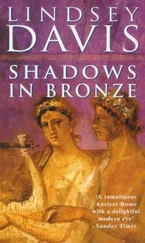So Ollia was still the painter’s wife and, unless she died in labour, he accepted that she always would be. Their children were Marciana, Ollius and Lolliana, Galliana and Varius. Ollia had named them. Larius would never have foisted ‘Ollius Lollius’ on anyone. She had to do the naming because after their first, which scared the boots off him, Larius managed never to be with her for the births. The last four comprised two sets of twins. He could not even begin to think how ghastly those labours must have been. It was almost enough to put you off sex. Almost.
Marciana, the eldest, was Larius’ favourite. Now eight, she even wanted to paint. She had talent and he was teaching her; it was theoretically impossible for a girl to do this professionally, but if it was what she wanted he would let her work with him. She was in Pompeii now, already able to bind a tint for him, or speak knowledgeably of Egyptian Blue and how a pinch of it sneakily added to chalk white would make the white brighter.
Marciana was regularly driven from Herculaneum in a neighbour’s rackety cart, when the neighbour came to the Saturday market. She brought her father clean laundry, food and news of the family. She would then remain in Pompeii for a few days while the neighbour consorted with his mistress; Marciana stayed with Larius’ landlady, not one of Pompeii’s grand entrepreneurs but a timid widow who lived in her own space on the ground floor, just across a courtyard from where Larius and Nonius slept upstairs.
His room was a dump so drab that Larius told his daughter she was not allowed there. For him it was merely a place to sleep, but if Ollia found out how bad it was, there would be ructions. Marciana understood. She never gave him away to her mother. The child bunked down with the widow, close enough for Larius to keep an eye on her; instinctively, even though she knew all about Nonius, she kept out of his sight. Marciana fed the old woman’s cats, sometimes fed the old lady, who was growing pathetic, then came to the site where she mixed paints and watched her father working. Learning, learning. When their neighbour from Herculaneum, Erodion, had had enough of screwing his secret ladylove, or when the bamboozled husband inconsiderately reappeared, Erodion jumped in his cart, returned to his own wife, and took the painter’s child back to her mother.
Marciana had a battered old basket that she carried to and fro with her. Her dolls poked out of it, a mixed collection made from terracotta, wood and rolled up rags; the rag doll had an arm missing, the wooden one was whittled for her by the other painter, Hylus. She hankered for a fully articulated ivory beauty, styled in the latest fashion; she knew such things existed, although they were too expensive. Every birthday and Saturnalia she hoped. A bright child, she knew it would never happen. Larius, who thought his children were heading for enough disappointments, was wise enough never to be drawn into a promise.
Marciana always had the cranky dolls tucked under an old, moth-eaten napkin in the basket as if they were lined up in bed. While travelling home in the neighbour’s cart, she kept the basket on her lap, solemnly talking to her dollies. Larius had been told their names often, though he forgot. It was hard enough remembering those of his own brood. Well, he knew, though not necessarily which name went with which child. Tough little tykes, they scoffed at him, accepting his vagueness yet perhaps storing up future resentment. You never loved me, you’re a terrible father, you couldn’t even be bothered to remember what my name was!
Hidden under her dolls in the basket were the wages Marciana took home for her family, after carefully deducting an allowance for her father. Nobody ever robbed her. Nonius, the dreadful sub-tenant, had no idea this gap-toothed little girl even existed, so that was how they thwarted him.
Marciana, very observant, had Nonius figured out as soon as she first saw him. ‘You’ll have to make sure that person doesn’t steal all your money, Father.’
‘Right!’
‘I shall take charge of it.’
Larius knew that the women in his family (except for his woefully useless mother) tended to take this line – though not normally at eight years old. He followed orders.
She was a good daughter. It was always a surprise to Larius that he, who could not be called a good father any more than his own was, somehow acquired this sensible, warm-hearted, talented, highly likeable child. And that she loved him.
He knew he did not deserve it. He could be too much like his own father. For instance, there was a gap of some years after Marciana and the first twins, before the second set. It happened when Larius accepted a call for trades to go overseas for a large prestigious building project in faraway Britannia. He was eighteen. At the time, they already had Marciana, and Ollia had just found out from the local wise woman that she was probably expecting a multiple birth next. Larius had matured, enough to see how he had trapped himself in misery, yet not enough to deal with it. Strife and fear for the future darkened his marriage. Good money was promised for the British adventure and he was feeling desperate. He had been working in the huge holiday villas of the very rich that lined the cliffs above Stabiae, fantasy palaces which only emphasised the squalor of his own life.
By then he knew his art. A good artist, who saw his talent, had trained him. Generously gave him chances. Pushed him forward to be noticed by clients. After four years, Larius was no longer an apprentice but an independent painter, specialising in exquisite miniature details. His pictures that would sit in the middle of panelled walls to draw the eye and stop the heart. On the strength of his skills, he was accepted for the fancy British job, which was financed by the new Emperor, Vespasian. He didn’t tell Ollia he was going. He just left a note.
‘How lucky I can read!’ she said grimly.
Larius claimed he needed to earn extra; in truth, he was going on the run from his wife, who knew it. Ollia feared he would never come back. It was a reasonable fear, because he himself dreamed of escape.
He worked abroad for a couple of years, telling himself he had got away. But the climate and provincial limitations of Britannia eventually made him homesick. The palace of King Togidubnus at Noviomagus was nearing completion so he was about to be laid off, then Larius had failed to organise himself to slip anyone the right bribes to obtain contracts on the new public buildings up in Londinium, the only other place in Britain offering work for an artist of his calibre. The south coast, his stamping ground, was becoming a tight spot for him. He had too many feuds with men he had drunkenly beaten up. Various women were after him. He came back to Italy.
He could have gone to Rome.
He should have done.
It was the terror of Ollia’s life that Larius would one day slide away to Rome, without her. Although they both had family there, neither kept up contact. Since they married he had never been back to his birthplace, because he knew that Ollia’s fears were correct; if he returned home, he would be permanently sucked in. Lovely Campania would see the last of him. He would never send for his wife and children; they would become ghosts to him. Larius would be subsumed into the hard drinking and hard living that made his father so repulsive, swamped by the demands of his extended family, taken over by the easy deceits and the fast bright hum of city life.
He was a loner here. It suited him.
On leaving Britain, the allure of the sea and the sunlit skies on this perfect bay drew him. Warmth, colour – and rich patrons wanting top quality décor. He returned to Ollia. It surprised them both. He stayed with her. Which was even more strange.
Читать дальше












